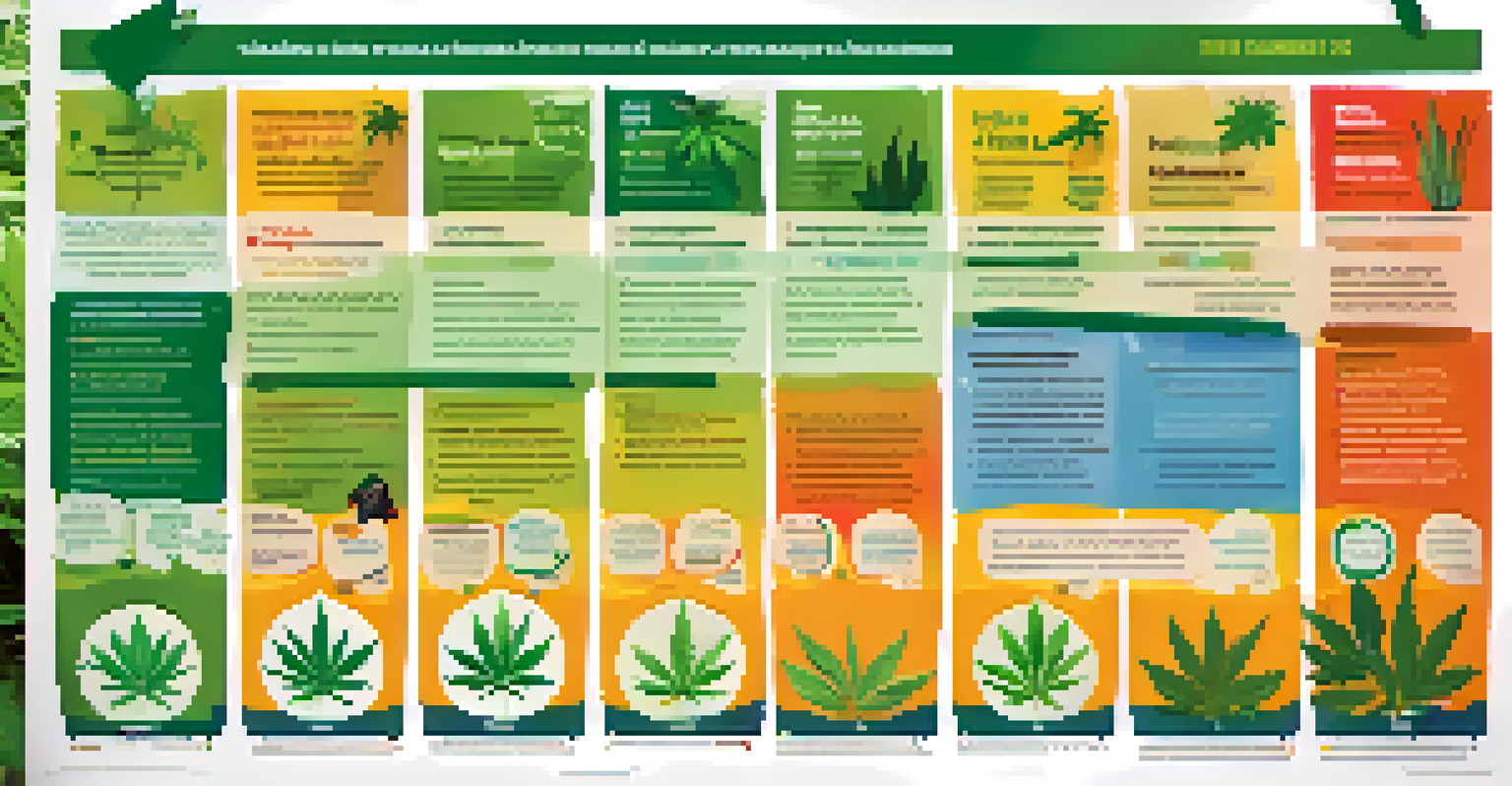Marijuana Legalization and Its Effect on Crime Rates

Understanding Marijuana Legalization
Marijuana legalization refers to the process of removing legal prohibitions on cannabis use, sales, and possession. This can vary significantly by region, with some places allowing recreational use, while others permit only medical applications. The conversation around legalization has gained momentum in recent years, fueled by changing public perceptions and a desire for regulatory control over the drug.
Marijuana prohibition has fueled black market activity, often leading to violent crime and gang involvement.
As laws evolve, it’s crucial to understand what legalization means in practical terms. In many jurisdictions, legalization has led to the establishment of regulated markets, which can help ensure product safety and quality. This shift not only offers economic benefits but also impacts law enforcement practices and societal norms surrounding drug use.
That said, the implications of marijuana legalization extend beyond economics and regulations; they also touch on social justice and public health. Advocates argue that legalizing marijuana can reduce the stigma associated with its use, encouraging more open discussions about drug education and addiction services.
The Link Between Crime and Marijuana Prohibition
Historically, marijuana prohibition has been associated with various crime-related issues. The illegal status of cannabis has fueled black market activity, often leading to violent crime and gang involvement. This underground market can create dangerous environments, not just for users but also for communities at large.

When marijuana is illegal, law enforcement resources are often stretched thin trying to combat the associated crimes. This can detract from efforts to tackle more serious offenses, such as violent crime or human trafficking. The focus on cannabis-related offenses can also contribute to unnecessary arrests, particularly among marginalized communities.
Legalization Affects Crime Rates
Research shows that marijuana legalization can lead to stabilized or decreased crime rates in certain areas.
Therefore, understanding the crime landscape before and during prohibition is crucial. It sets the stage for evaluating how legalization might change these dynamics and whether it truly leads to a reduction in crime rates.
Analyzing Crime Rate Trends Post-Legalization
Research indicates that in some areas where marijuana has been legalized, crime rates have either stabilized or decreased. For instance, states like Colorado and Washington have reported declines in certain types of crime, including property crimes. These trends raise important questions about the relationship between legal cannabis markets and overall public safety.
Legalization offers an opportunity to address these historical injustices.
However, the impact of legalization on crime rates is not uniform across all jurisdictions. Factors such as local law enforcement practices, community engagement, and socioeconomic conditions play significant roles in shaping these outcomes. Consequently, while some areas may experience reductions in crime, others may not see the same results.
It's essential to analyze data over time to fully understand these trends. Short-term fluctuations might not reflect the long-term effects of legalization, making it vital to approach the statistics with a critical eye.
The Role of Regulation in Crime Reduction
Regulating marijuana sales can significantly affect crime rates by reducing the black market's appeal. When consumers have access to legal products, the incentive to purchase from illicit sources decreases. This shift can lead to safer communities, as organized crime often thrives in the shadows of prohibition.
Moreover, regulation can provide governments with the resources needed to enforce laws and maintain public safety. Tax revenues from legal cannabis sales can be reinvested into community programs, education, and law enforcement initiatives. This creates a holistic approach to crime prevention and community health.
Social Justice Gains from Legalization
Legalizing marijuana offers a chance to rectify historical injustices faced by marginalized communities through expungement of past convictions.
However, effective regulation is crucial. Poorly designed policies can lead to new challenges, such as overregulation that drives consumers back to the black market. Striking the right balance is essential for maximizing the benefits of legalization.
Public Health Considerations in Legalization
Legalizing marijuana also brings public health considerations to the forefront. With increased access to cannabis, there is a need for education around responsible use, particularly among vulnerable populations like youth. Effective public health campaigns can help mitigate potential risks associated with increased availability.
Conversely, some studies suggest that legalization may lead to decreased opioid-related deaths, as individuals turn to marijuana as a safer alternative for pain management. This shift could significantly impact crime related to drug abuse and addiction, highlighting the complexity of drug policy.
As with any public health issue, ongoing research is essential. Understanding the long-term effects of legalization on community health can inform future policies and help address any emerging concerns.
Social Justice Implications of Legalization
One of the most pressing issues related to marijuana legalization is its impact on social justice. The War on Drugs disproportionately affected marginalized communities, leading to higher arrest and incarceration rates for non-violent offenses. Legalization offers an opportunity to address these historical injustices.
By expunging past convictions related to marijuana offenses, states can help restore rights and opportunities to those previously impacted. This step not only aids in individual rehabilitation but also fosters a sense of community and trust between law enforcement and citizens.
Regulation Reduces Black Market Appeal
Effective regulation of marijuana sales can diminish the allure of the black market, promoting safer communities.
Additionally, legalization can pave the way for equitable business opportunities in the cannabis industry. Ensuring that communities historically harmed by drug policies benefit from the new legal market is essential for true social justice.
Future Outlook: Legalization and Crime Rates
The future of marijuana legalization and its effects on crime rates remains a dynamic and evolving topic. As more states and countries consider legalization, ongoing research will be crucial in understanding its long-term implications. Policymakers must remain adaptable, learning from the successes and challenges of early adopters.
Public opinion continues to shift towards favoring legalization, which may further influence legislative changes. As society becomes more accepting of cannabis, it’s essential to maintain a focus on public safety and health to ensure that the benefits of legalization are maximized.

Ultimately, the relationship between marijuana legalization and crime rates is complex and multifaceted. Continued dialogue, research, and community engagement will be key to navigating this evolving landscape.